 Photo: Unity in Defense of Ancestral Lands. By Benjamin Wachenje / Global Witness
Photo: Unity in Defense of Ancestral Lands. By Benjamin Wachenje / Global Witness
Human rights defenders push for UN Special Procedures to recognize and address human and land rights violations faced by indigenous Tuwali communities in the Philippines
In the Philippines, respect for human and environmental rights has been undermined by the impact of extractive companies. Since 1994, human and environmental rights defenders have waged a long struggle against the Australian-Canadian mining company, Oceanagold Corporation in connection with its mining operations in Barangay Didipio, Nueva Vizcaya.
Studies on the impact of Oceanagold’s activities revealed that 80% of Dipidio residents near the mine have problems accessing clean water, and that rivers are polluted up to eight times above safety levels intended to protect riverine biodiversity. There are also various other issues affecting forests, land use, chemicals management, and labor, indigenous, and other human rights. For denouncing the significant negative impact of the mining corporation’s activities on the rights of the local community, human, indigenous and land rights defenders were harassed, threatened, and even killed. Many killings were linked to the military or pro-government militias operating near resource development projects.
In March 2014, nine people were murdered, including William Bugatti, a prominent Tuwali activist from the nearby province of Ifugao. In August 2014, three indigenous rights activists were murdered within one week, two of whom were involved in disputes with a local palm oil and mining company. The regional NGO Asia Indigenous Peoples Pact described the ongoing violence against indigenous communities as a 'systematic attack' intended to 'stifle their opposition and struggle to defend their ancestral lands'.
Human rights defenders were exposed to great danger as their work. Because of their location in a provincial area, they were not very visible to the diplomatic community or to larger or professional NGOs. As with many opposition groups, they were considered enemies of the State by the government of the Philippines. The lack of international attention to their case and ignorance of their struggle increased the risk of retaliation for their activities. Thus, they decided to turn to the UN Special Procedures mechanism.
“You get desensitized at some point because of how wholesale the murders are. We are basically living with half of our body already six feet under.”
Leon Dulce, Kalikasan PNE’s national coordinator. He has spent nearly a decade recording the number of people killed while trying to protect the environment
The deteriorating situation for environmental human rights defenders in the Philippines continued for years to 2020:
“The Philippines is now one of the two most dangerous countries for those who defend human and environmental rights according to Global Witness. This year, the United Nations High Commissioner for Human Rights’ report on the Philippines found serious human rights violations, reinforced by harmful rhetoric from high-level officials against, among others, human rights organizations, lawyers, political and judicial actors, journalists, trade unionists, and religious groups”
Patricia Lisson of ICHRP-Canada (Canada International Coalition for Human Rights in the Philippines)
ISHR article on Leon Dulce, national coordinator of the Kalikasan People’s Network for the Environment - 24 September 2020.
Exhaustion of National Remedies
For years, the Kalikasan People’s Network for the Environment (Kalikasan PNE), a non-governmental organisation (NGO) that works to prevent environmental exploitation and protect marginalised communities from its impact, had tried to advance its cause within the existing legal system. They had reached out to the Commission on Human Rights of the Philippines, participated in congressional hearings, and sought to use other national mechanisms, such as the then-Secretary of the Environment mining audit procedures. All these national bodies found that Oceanagold had been involved in various human rights violations – but they had little power, and the company continued to operate with limited regulation and broad impunity.
UN Special Procedures
Human rights and environmental activists from local indigenous Tuwali communities in the province of Ifugao began to collaborate with Kalikasan PNE. After a protest that called for President Duterte to deny the license renewal of Oceanagold mine resulted in no action taken by the government, the defenders decided to engage with the UN Special Procedures. They hoped that, despite the government’s hard-line stance on UN cooperations, a communication from the UN Special Rapporteurs would pressure the Duterte government to act.
In 2018, a complaint was submitted to the UN Special Procedures that outlined how the Duterte government had failed to protect human rights by failing to stop human rights violations and environmental destruction by Oceanagold. (See What happened at the UN? for more information.)
Ongoing National Activities
Human rights defenders continued their work of monitoring and sensitisation, including:
Continued monitoring of the actions and communications of the company.
Seeking support from international NGOs. News article - 17 December 2018.
Seeking support from officials, such as the Canadian Embassy in the Philippines, calling on Canada to take action against the Canadian company in alignment with that government’s guidelines. News article - 18 December 2018.
Mobilising human rights defenders’ networks at the international level to join the national campaign. Video of ‘UK organisations calling to end Oceanagold operations’ - 8 August 2019.
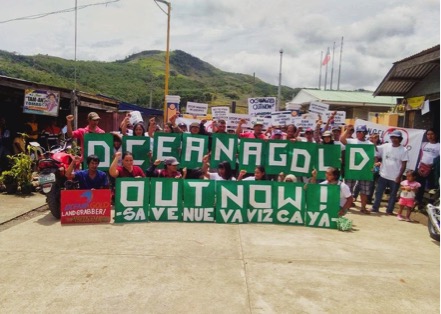 Photo: Protests against Oceanagold. By Kalikasan PNE, 11 September 2019.
Photo: Protests against Oceanagold. By Kalikasan PNE, 11 September 2019.
Producing short information video (40 seconds) ‘United Nations complaint filed versus Oceanagold’ on how defenders have engaged with the Special Procedures and the government response - 28 August 2019.
Creating a short video ‘Defending the Philippines’, with Global Witness - 23 September 2019.
Webinar organised by Kalikasan on Human Rights and Environmental Defenders in the Philippines - 10 August 2020.
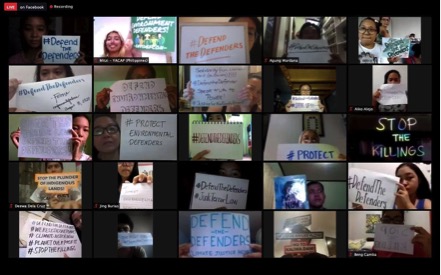 Photo: Webinar on Human Rights and Environmental Defenders in the Philippines. By Kalikasan, 10 August 2020.
Photo: Webinar on Human Rights and Environmental Defenders in the Philippines. By Kalikasan, 10 August 2020.
Creating a national campaign to protect the environment, natural resources, and people’s rights in the province of Nueva Vizcaya, Save Nueva Vizcaya Movement - 5 September 2019.
Using social media to promote activities, and engaging with international organisations, like Global Witness - 9 August 2020.
Indigenous peoples in the Philippines continue to be at risk of reprisals for defending their homes, lands, and the environment. This #IndigenousPeoplesDay, we stand with indigenous land and environmental defenders!
— Karapatan (@karapatan) August 9, 2020
Read the Global Witness report here: https://t.co/Yuejg6yMh9 pic.twitter.com/zI2ZlTQFwP
Other UN Human Rights Mechanisms
The defenders continued also to monitor sessions of the Human Rights Council and engaged at key moments, for example making submissions and comments in regard to HRC resolutions adopted on the issue, and organising side events. Human rights defenders worked together, and collaborated with other types of organisations in the country in making their submissions and organising these activities. (See section on What happened at the UN?)
Some defenders also contributed to the Universal Periodic Review of the Philippines.
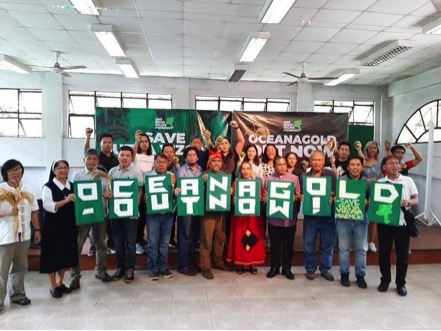 Photo: Nueva Vizcaya Movement launches campaign, seeks House probe into Oceanagold mine. By Mining Injustice Solidarity Network, 5 September 2019.
Photo: Nueva Vizcaya Movement launches campaign, seeks House probe into Oceanagold mine. By Mining Injustice Solidarity Network, 5 September 2019.
Special Procedures
In 2018, Kalikasan PNE submitted information to the UN Special Procedures that outlined how the Duterte government had failed to protect human rights by failing to stop human rights violations and environmental destruction by Oceanagold... The NGO urged the UN to conduct an independent investigation into the human rights situation in the Philippines, hoping the inquiry would lead to greater action from the UN experts and other UN member States to hold the Duterte regime to account.
“We filed a UN special procedures complaint against President Duterte as he allows Oceanagold to continue operating even after his erstwhile Environment Secretary ordered the mine to be suspended in February 2017. Worse, indigenous people and environmental defenders opposing Oceanagold mining have now become the targets of Duterte’s crackdown and militarization.” Leon Dulce, National Coordinator for the Kalikasan PNE
On 13 February 2019, nine Special Procedures mandate holders sent a joint communication letter to the government of the Philippines, the government of Australia, and to Oceanagold highlighting their concerns over the environmental impact of the company’s activities and the lack of consent of indigenous and local communities for the mine to operate on traditional lands.
The joint communication from the Special Procedures obliged Oceanagold to react by replying to these allegations within 60 days, which it did. A formal response by the company was issued on 12 April 2019.
On 30 April 2020, in a press release issued by the OHCHR, a group of UN Special Rapporteurs cited this communication once again, and urged the Duterte government to respect indigenous people's rights in response to an earlier violent dispersal of the Tuwali protester’s ongoing barricade against the mine.
“The tensions within the communities will escalate if the company and the national government do not act transparently and with consultation of affected peoples, particularly in relation to the contested right of the company to operate after expiration of their official permit.” Victoria Tauli-Corpuz, Special Rapporteur on the rights of indigenous peoples; Clément Nyaletsossi Voule, Special Rapporteur on the rights to peaceful assembly and of association; David R. Boyd, Special Rapporteur on human rights and the environment.
In the statement, the Special Procedures urged the Philippines government not to discriminate against indigenous peoples in favour of business interests and when enforcing anti-COVID19 measures. This group of experts included the Special Rapporteurs on the Rights of Indigenous Peoples, the Rights to Peaceful Assembly and Association, and the Special Rapporteur on Human Rights and the Environment.
“The protesters were exercising their right to freedom of assembly to object against the continued operations in the Didipio mine. The government and mining company should have engaged them in peaceful and constructive talks instead of dispersing the crowd forcefully. The use of force by the police was unnecessary and disproportionate.” Victoria Tauli-Corpuz, Special Rapporteur on the rights of indigenous peoples; Clément Nyaletsossi Voule, Special Rapporteur on the rights to peaceful assembly and of association; David R. Boyd, Special Rapporteur on human rights and the environment.
In response to the issues raised in the 30 April press statement of the Special Rapporteurs, Oceanagold provided a response.
In their letter of 1 May 2020, the company detailed how it had responded and engaged with the UN Special Procedures since 2019, from the date the initial joint communication from several UN Special Procedures was received in February 2019. They described the face-to-face meetings with OHCHR staff in Geneva in June 2019, and stated that the allegations that it had not maintained significant dialogue with local communities were untrue. They stated that the company was committed to the UN Guiding Principles on Business and Human Rights, the Voluntary Principles on Security and Human Rights, and the concept of Free, Prior and Informed Consent.
On 25 June 2020, after the release of the report by the OHCHR pursuant to Human Rights Council Resolution 41/2 (see below), a group of 23 UN human rights experts renewed their public call for the Human Rights Council to:
Report of the Special Rapporteur on human rights and the environment to the Human Rights Council
After his report was presented to the 43rd regular session of the UN Human Rights Council (on 2 March 2020), UN Special Rapporteur on Human Rights and the Environment met with Filipino environmentalists and defenders from Kalikasan PNE and Paghidaet Kauswagan Development Group (PDG), and indigenous leaders in Geneva. Defenders took advantage of the opportunity to raise concerns about dangers faced by activists, the militarization of territories, large-scale mining, and forced displacement. In his report, the Special Rapporteur had highlighted mostly best practices regarding the protection of environmental rights. Special Rapporteur, in his remarks following civil society interventions during the Council debate, including that of Kalikasan, said that he unconditionally condemns all acts of intimidation, harassment, criminalization, and violence against environmental and human rights defenders.
Human Rights Council
Defenders continued to monitor the regular sessions of the Human Rights Council Sessions and engaged at critical moments, through written and oral statements and submissions, organising side events, and contributing to resolutions.
In July 2019, at its 41st regular session, the HRC adopted Resolution 41/2 which requested the UN Office of the High Commissioner for Human Rights (OHCHR) to prepare a comprehensive written report on the situation of human rights in the Philippines and to present it at its 44th session in June 2020.
At this Council session, human rights defenders organised side events in collaboration with international partners (including international and regional NGOs, permanent missions in Geneva of allied countries, and UN Special Procedures).
On 26 June 2019, defenders participated in a side event on freedom of expression in Asia, where the Special Rapporteur on the promotion and protection of rights to freedom of opinion and expression also remarked on the human rights situation in the Philippines.
On 27 June, national, regional and international organisations jointly organised a side event which provided updates from Philippine civil society and its national human rights institution on the government’s ongoing ‘war on drugs’, and the threats faced by human rights defenders. At this event, defenders focused on issues covered by the resolution that was ultimately adopted at the 41st session of the Council.
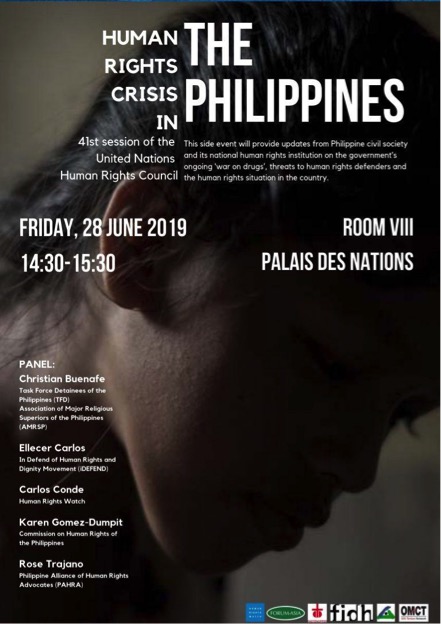 Photo: HRC side event poster: Human Rights Crisis in the Philippines. By Forum Asia. 28 June 2019
Photo: HRC side event poster: Human Rights Crisis in the Philippines. By Forum Asia. 28 June 2019
In response to the UN Human Rights Council Resolution 41/2 adopted in July 2019 and as contributions to the report of the OHCHR, human rights defenders made both individual and collective submission detailing the human rights situation of the Philippines and the plight of both defenders and local populations:
- Kalikasan PNE Submission - 30 January 2020
- Submission of Karapatan, an alliance of human rights organisations - 9 December 2019
- Submissions of the EcuVoice Network members - 28 May 2020
The OHCHR issued its comprehensive written report on 29 June 2020, which was informed by submissions by civil society (see the section What did human rights defenders do?). The report confirmed the findings of the UN human rights experts that there had been widespread and systematic killings and arbitrary detention.
On 30 June, at the 44th regular session of the Human Rights Council during the enhanced interactive dialogue on the situation of human rights in the Philippines, Michelle Bachelet, UN High Commissioner for Human Rights, noted in a statement that ”The report finds that more than 248 human rights defenders, lawyers, journalists and trade unionists were killed between 2015 and 2019. This includes a large number of environmental and indigenous peoples’ rights defenders”.
The ongoing concerns, including the killing of two human rights defenders, were also highlighted in an OHCHR press briefing on 21 August 2020.
National and international civil society organisations made statements during the Interactive Dialogue welcoming the statement of the High Commissioner for Human Rights and highlighting key issues in the OHCHR report. Karapatan, in alliance with Geneva-based NGO CIVICUS, called on the members of the Council “to follow up with action and deliver a strong resolution...No country is above scrutiny, nor should they be above accountability”. (Watch the video of the NGO oral statements.)
In Resolution 45/33 adopted on 28 September 2020, the Human Rights Council again condemned all “acts of intimidation and reprisal, both online and offline” against human rights groups and other critics” in the Philippines.
Watch the video of the Council vote on the draft resolution 45/33 on 7 October 2020.
The Ecumenical Voice for Human Rights and Peace in the Philippines (EcuVoice) noted that the resolution is proof that the government, despite its belligerent stance and statements in past HRC sessions, has started to acknowledge “domestic and international pressure for justice and accountability” for its reported human rights violations.
“The resolution comes after the damning report of UN High Commissioner for Human Rights Michelle Bachelet on the persistent and widespread killings and human rights violations in the Philippines, the numerous statements of UN Special Procedures expressing concern on the situation, the European Parliament resolution calling on the European Commission to initiate the temporary withdrawal of trade perks of the Philippines in the light of the serious rights violations, and the proposed measure at the US Congress to end military and police aid to the Philippine government.” EcuVoice
Human rights group Karapatan noted that the new resolution was “a sign that the international community remains committed in closely monitoring the situation of human rights in the country.”
IN THE NEWS: Karapatan secretary general Cristina Palabay challenged the government to “allow the access of UN human rights mechanisms in the country to assess domestic accountability mechanisms if they are truly working and if they have nothing to hide.” https://t.co/bmtOSZyKYu
— Karapatan (@karapatan) October 8, 2020
Universal Periodic Review
During the Universal Periodic Review of the Philippines in 2017, dangers faced by human rights defenders and concern over industrial projects taking over indigenous lands were highlighted. Many civil society organisations made submissions as part of the review process. The national NGO Karapatan noted in its report that “there was a lack of effective and substantive implementation of the international and domestic human rights framework adopted by the Government”.
Regarding the issue of violation of due process, the Philippine Alliance of Human Rights Advocates in conjunction with international partners, put forward in their submission that anti-war policies were instrumentalized against human rights defenders.
In this cycle, 257 recommendations from Council member States were issued to the Philippines, including for example, Sierra Leone which encouraged the ratification of the International Convention for the Protection of All Persons from Enforced Disappearance. This recommendation stated that efforts to eradicate the use and distribution of illegal drugs should not be detrimental to the respect and promotion of human rights and freedoms. Other nations, such as the United Kingdom, urged the Philippines to ensure thorough and independent investigations into all violent deaths and to commit to bring to justice those involved, including security forces.
Note that because the Universal Periodic Review happens approximately once every five years for a particular state, UPR is not ideal to respond to urgent or rapidly changing situations, unless the timing of the review aligns with the campaign.
At National Level
The communication of the UN Special Procedures has had a direct impact within the country. It helped to create the momentum that led the provincial government to issue a restraining order against the Oceanagold mine. Nevertheless, despite the pressure put on the Philippine government and Oceanagold to respect the demands of human and environmental defenders, and despite the continuous monitoring of their actions, progress is still awaited in terms of full collaboration from the government of Philippines with the UN Special Procedures.
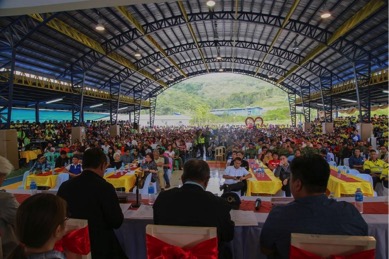 Photo: Philippines Congressional Committee on Indigenous Cultural Communities and Indigenous Peoples. By Oceanagold.
Photo: Philippines Congressional Committee on Indigenous Cultural Communities and Indigenous Peoples. By Oceanagold.
On 28 February 2020, the Philippines Congressional Committee on Indigenous Cultural Communities and Indigenous Peoples (a standing committee of the House of Representatives of the Philippine government) held a public hearing at the Didipio Mine to explore environmental and human rights allegations made against the operation. The Congressional Committee heard presentations around the allegations and gave representatives the opportunity to directly answer all questions or concerns about the operations in an open forum. Following the Committee hearing, all parties were invited to submit their position papers to be considered by the Committee. However, human rights defenders believe this hearing to be a ‘sham’ (see below).
The pressure on Oceanagold has led the company to publicly report information relating to their stakeholder engagement activities and compliance obligations. Oceanagold has committed also to reviewing its policy of transparency and accountability towards the human rights of local populations.
“We reiterated our Didipio Mine is committed to being a good corporate citizen, and that this commitment encompasses our respect for the environment and internationally recognised human rights, including the rights of indigenous peoples. We noted that we are also committed to engagement on an effective and genuine basis with all stakeholders impacted by our operations, including global and local civil society groups.” Oceanagold Corporation
Oceanagold has also created a web page dedicated to explaining its policies on human rights, and the actions it took to comply with the requests of the UN bodies. Oceanagold reiterates its willingness to collaborate with the UN High Commissioner for Human Rights, to cooperate and listen through ‘meaningful dialogue, respecting local cultures, and acting in good faith and transparently.’
Following its formal response to the OHCHR in April 2019, Oceanagold representatives met with various UN bodies, including the Chair-Rapporteur of the Working Group on Business and Human Rights, the Chief of the Special Procedures branch of the OHCHR and with staff for the UN Special Rapporteurs on hazardous substances and wastes, safe drinking water and sanitation, the rights of indigenous peoples, and the situation of human rights defenders. The meetings were an opportunity to discuss the company’s response to the information requests, and to answer any further questions from the UN Special Procedures.
Beyond dialogue with the UN, Oceanagold has also engaged with the different groups living in the area around the Didipio mine, suggesting greater consideration of the impact of its actions on human and environmental rights, though human rights groups believe this is a sham (see below).
The use of UN mechanisms was successful in raising awareness of and putting a spotlight on the issues, as well as contributed to holding the company accountable for its human and environmental impact and responsibility.
The cause of human and environmental rights defenders in the Philippines has been reinforced through the engagement and support of the UN Special Rapporteurs. The UN communication provided further visibility for the situation on the ground, thus strengthening the legitimacy of defender’s actions and ensuring greater protection against abuses and violations, as well as reducing their fear of reprisals.
Human rights groups and defenders in the Philippines also worked together and raised their voice through alliances, coalitions and networks. Larger NGOs collaborated with local human rights defenders. The call for change was thus amplified and based on real change and impact.
Activists of the Kalikasan PNE were able to follow up and condemn the public hearing of the House of Representatives Committee on Indigenous Cultural Communities by denouncing the lack of information on the holding of this event to those who are critical towards the company, the imbalance in speaking time between company representatives and local defenders, and the lack of substance in discussions that did not mention human rights and environmental violations.
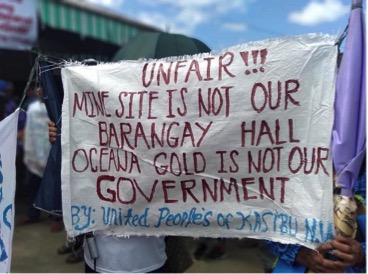 Photo: Protesting residents hoist banners that express their dismay over the “sham” public hearing. By United Peoples of Kasibu, NV, 28 February 2020
Photo: Protesting residents hoist banners that express their dismay over the “sham” public hearing. By United Peoples of Kasibu, NV, 28 February 2020
Human rights defenders are now (in 2020) calling for a genuinely independent investigation into the human rights crisis systematically created by Oceanagold, hoping that the Special Rapporteurs who raised concern over the actions of the company will be invited to investigate on the ground.
International level
By engaging with the UN human rights mechanisms, human rights defenders have raised awareness of this case at the international level, successfully mobilising human rights groups across jurisdictions. International defenders and groups were also mobilised to support the cause of human rights groups in the Philippines.
This case has the potential to encourage other companies to promote transparency, dialogue, and collaboration with local populations. This case may be a precedent which could influence companies in the future to work with all key actors and stakeholders in a way that respects human and environmental rights. However in the Philippines and with this case, the allegations and work of defenders continue. See the Follow the Story section below.
Crucial to success in this case, was the fact that the human rights defenders strategically located the engagement with UN Special Procedures within an interplay of various other advocacy tactics. The UN intervention fed into and was aligned with the direct action of organised communities of defenders, and helped galvanise a broad support network of churches, local governments, and civil society.
The UN intervention was also leveraged by human rights defenders in a communications and lobbying strategy that not only exposed the national government’s collaboration with irresponsible big businesses, but also discouraged their usual ‘rubber-stamping’ for these mining corporations. This also helped to deter reprisals against the defenders.
When human rights defenders are working in the background without the support of national, regional, or international networks, they can be subject to reprisals and are targeted by government or corporate interests. To protect against reprisals, human rights defenders should take steps to raise awareness and bring the spotlight to the issue and on their actions. The United Nations or international community’s focus on an issue also protects the defenders by allowing them to work knowing that their acts are known and monitored, thus they are better protected from any further violation or abuse.
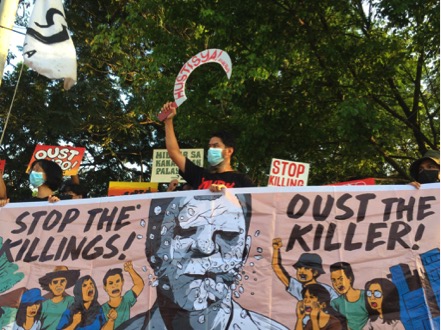 Photo: Protests at the Commission for Human Rights to condemn the Bloody Sunday raids. By Karapatan, 7 March 2021.
Photo: Protests at the Commission for Human Rights to condemn the Bloody Sunday raids. By Karapatan, 7 March 2021.
After years of struggle, the Philippines human rights defenders are still monitoring the situation and hoping that the Oceanagold mine will be permanently shut down.
Defenders are also currently fighting against the implementation of measures taken by the government to address the recent COVID-19 pandemic, particularly when the use of such measures result in a violation of human and environmental rights.
In May 2020, a letter was addressed to president Duterte requesting an urgent appeal for action on attacks against Indigenous communities. The letter raised concerns how measures to address the pandemic had been implemented excessively resulting in increased risks to human rights defenders.
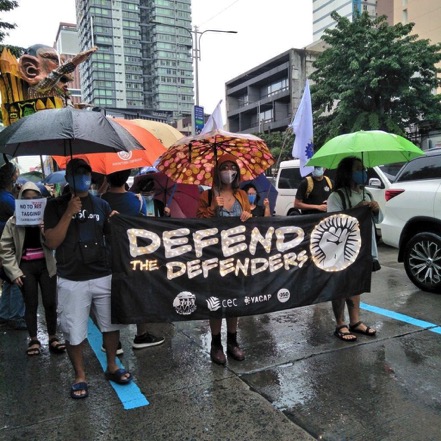 Photo: Defend the Defenders protests. By Kalikasan, 10 December 2020.
Photo: Defend the Defenders protests. By Kalikasan, 10 December 2020.
To follow this story, visit the websites of some of the key human rights defenders:
For additional information:
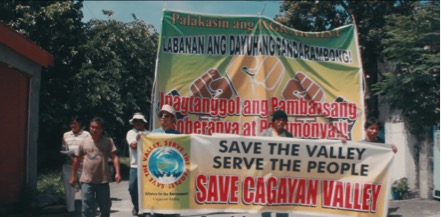 Video: Still from This is Our Land. By Noni Abao, August 2020.
Video: Still from This is Our Land. By Noni Abao, August 2020.